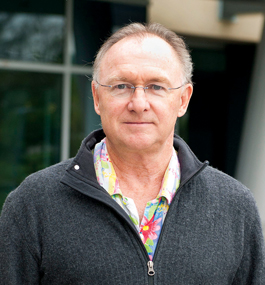The Art of Basic Science

Courtesy Regeneron
Neil Stahl, PhD’85
by Lawrence Goodman
As a doctoral student in pioneering biochemist William Jencks’ lab, Neil Stahl, PhD’85, learned a critical lesson: “Always focus on the data.”
It’s a dictum that has stood him well during his 30-year career as a top executive at Regeneron Pharmaceuticals, which received widespread publicity late last year after former President Donald Trump was given the company’s newest product, REGEN-COV, to treat his COVID-19. Trump’s swift recovery was a public relations coup for both the company and its product.
At the time, REGEN-COV was approved for “compassionate use” only. One month later, the FDA authorized using the drug to treat COVID-19 in high-risk patients (such as people with diabetes or asthma) who have mild to moderate disease. In January, Regeneron announced preliminary data showing the medicine had prevented COVID-19 in a clinical trial.
REGEN-COV relies on monoclonal antibodies — synthesized antibodies that work a lot like the ones in the body — that target the spike protein on the COVID-19 virus, preventing the virus from entering cells.
Stahl, executive vice president of research and development at Regeneron, believes the company’s success is due to its focus on basic research, fueled by a mindset of deep collaboration. “Our style of working is heavy, heavy brainstorming,” he says. “The best scientists in the company all get in a room, and we toss around and debate ideas. Every single time we do that, we come up with a better product than we had when we walked into the room.”
This scientific approach has led to a product pipeline that includes treatments for Ebola, age-related macular degeneration, cardiovascular disease and genetic disorders.
“People who succeed at Regeneron are the ones who share Jencks’ philosophy,” says Stahl. “It’s understanding that when people are criticizing your data or your interpretation of the data, they’re not criticizing you. They’re trying to get to Truth with a capital T.”
When Stahl interviewed at Regeneron in 1990, the company was 2 years old, with a staff of 60 and no in-house library. “I just thought there’s no way I could ever join this rinky-dink operation,” he says. But as he learned more about Regeneron’s researchers and their approach and ambitions, he sensed the company would achieve groundbreaking scientific breakthroughs.
He also decided he preferred the collaborative approach taken in the private biotech sector to the more isolated path he’d have to follow in academia. “I thought I could actually learn more science at Regeneron, working within a group of people,” he says, “than I could as a lonely assistant professor working on a much narrower topic.”
In private industry, “there are also fewer barriers to doing research,” Stahl adds. “The scientific leadership just has to agree this is what we want to do, and then we do it.”
Nearly 20 years passed before Regeneron got its first FDA-approved product, Arcalyst, which treats several rare genetic disorders. But along the way, the company developed a series of new technologies that greatly speed up the drug-development process.
Patented techniques the company calls VelociGene and VelociMouse, for example, have made it much easier and quicker to produce and breed the genetically modified mice needed to study diseases. These advances laid the foundation for a slew of new drugs the company brought to market in the 2010s, including its multibillion-dollar bestseller Dupixent, which treats asthma, atopic dermatitis and other serious inflammatory conditions.
In 2014, Stahl got involved in what he describes as “making a new drug I hoped no one would ever need.” Less than six months after an Ebola outbreak in West Africa, which eventually killed more than 10,000 people, Stahl and his team had come up with the first-ever FDA-approved treatment for the illness. Inmazeb consists of three monoclonal antibodies that, when injected into the bloodstream, attack a protein on the virus, effectively rendering it harmless.
When another Ebola outbreak struck the Congo in 2018, Inmazeb was shown to reduce the death rate among patients from more than 50% to 33.5%. In patients who were treated within five days of showing symptoms, survival increased from about 35% to 90%. The drug also outperformed two other investigational Ebola treatments.
Stahl strongly encourages undergraduates to consider a career in his industry. “If we can get some young Brandeisians into biotech and do some novel things, that’d be great.”
